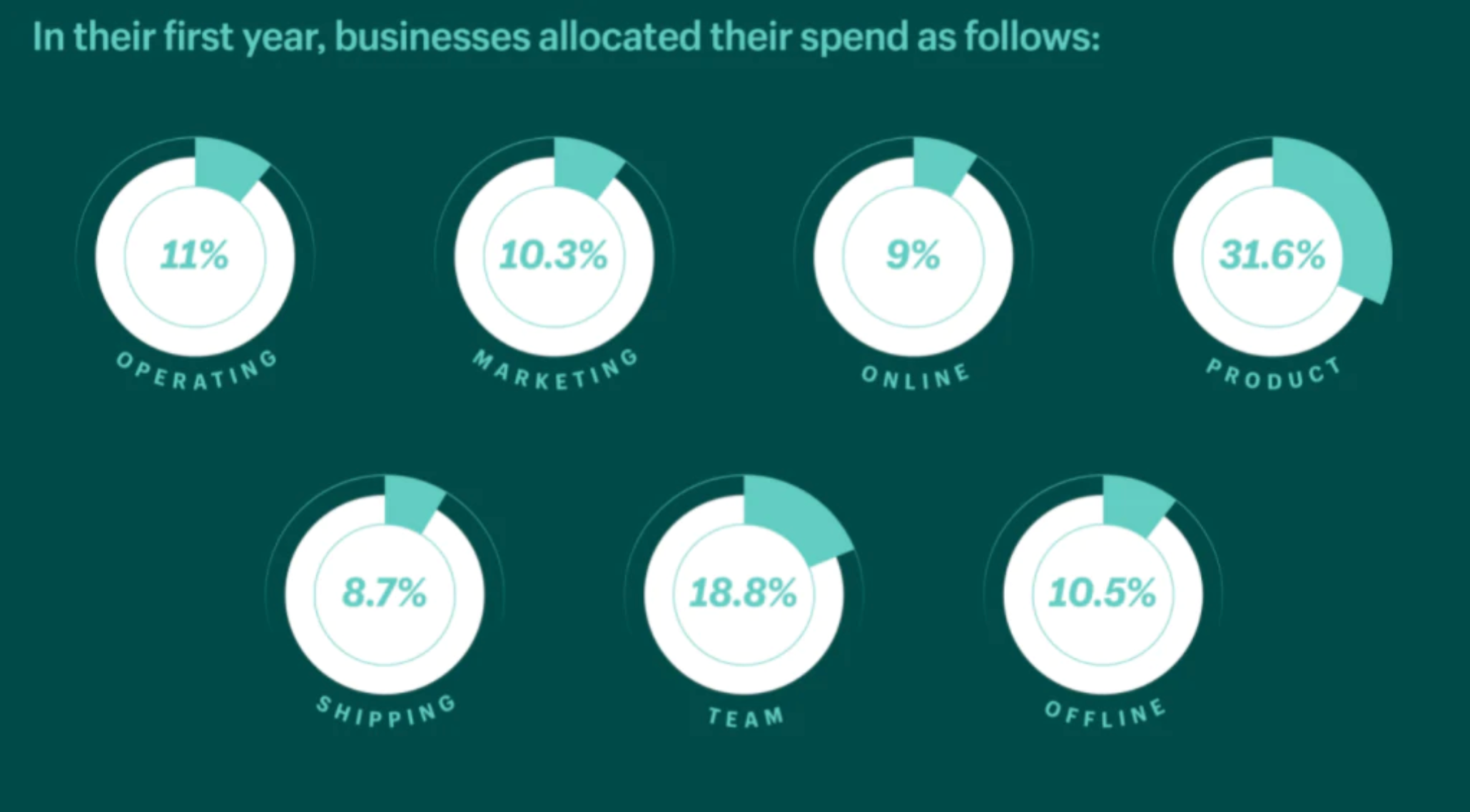Have you ever dreamed of starting your own online business? Some of us, at some point, certainly have as it provides us a sense of accomplishment and independence, especially so if you are a talented entrepreneur.
However, not knowing where to start hinders most people from following through with their dream to start an ecommerce business.
Ecommerce businesses, or those that buy and sell goods and services online, are booming. There’s never been a better time to start an online business than now, with worldwide ecommerce sales expected to reach $5 trillion in 2022 and $6 trillion by 2024.
Starting an online business is hard work and requires many processes and decisions to be in place at the right time, however promising the ecommerce future is. Set yourself up for success with this step-by-step instruction that teaches you how to get each of these steps done.
What is the best way to start an ecommerce business?
Online shopping is popular in recent years. It’s a topic, or rather a lifestyle we have grown accustomed to. So, how do you go about starting an internet business in the real world?
To assist you, we’ve put together a thorough blueprint for starting an online business, arranged around the most crucial tasks you’ll encounter while researching, developing, and building a lucrative ecommerce business.
- What are you selling?
- Research and prepare
- Getting your business started Launching preparations
- What’s next after the launch?
1. What are you selling?
Searching for a product to offer
Undeniably the most challenging aspect, and also the very first step in building a new online startup is knowing what products you want to offer to customers. We’ll walk you through how to locate product opportunities, where to hunt for product ideas, and which ecommerce products to consider in this section.
Assessing Your Idea
How can you tell if a product idea will sell after you have it? We’ll go through a few methods that active entrepreneurs have used to validate their product ideas and prospective market in this part.
Sell your merchandise online
Shifting your physical store online can help you deal with the difficult situation that many independent retailers face, besides increasing your cash flows and establishing a more resilient business. To build your store, it is important to choose a reputable ecommerce solution.
2. Do your homework and get ready
Examine the competition
Simply put, research your competitors thoroughly. With your product identified, its potential assessed, and a vendor sourced – you will now need to study your competitors so you know what you’re up against and how you can set yourself apart.
Write Your Business Plan
A business plan is a road map that guides you through the process of bringing your ideas and thoughts together. It is the key to getting your priorities straight and reaching your potential customers effectively. Now that you’ve completed your competition research, it’s time to craft your business plan.
3. Getting your business started

Choose a business name
Aside from finding an actual product to offer online, deciding on a business or brand name and selecting a suitable and available domain name is a difficult decision. These blog postings will assist you in completing these crucial duties.
Developing a logo
It’s time to create a simple logo after you’ve chosen a memorable name and registered a corresponding domain. We’ll show you numerous possibilities for producing a beautiful logo for your new business in these resources.
Understanding Search engine optimization (SEO)
You’re nearly ready to start building your online store. However, before you begin, you should learn the fundamentals of search engine optimization so that you can properly structure your site and pages for search engines.
Constructing your store
It’s time to expand your store now that you’ve gained a deeper grasp of search engines. There are numerous important factors to consider. We’ve compiled a list of must-reads to assist you in creating high-converting product pages, writing appealing product descriptions, shooting stunning product photography, deciding on an ecommerce colour palette, and more.
Selecting your sales channels
Choosing sales channels where customers currently purchase is one of the most effective ways to reach them. The best mix of sales channels will be determined by your products and target market, but there are a few outstanding possibilities that can complement and support your self-hosted business.
4. Launching preparations
There are a number of shipping and fulfillment aspects to get ready for as you get closer to launching your business. We’ve compiled a few extensive guides on how to figure out your shipping strategy in this section.
You may also want to consider defining your key performance indicators ahead of time so you’ll know what metrics to track after you launch.
5. After the launch

Getting your first client
The hard work of marketing your products begins now that you’ve launched. While many new business owners should consider selling their products in person, the remainder of digital marketing is based on one thing: attracting targeted traffic. Following that, we’ll go over a number of marketing strategies that will assist you during your initial few months in business.
Marketing your store
Once you have made progress and acquired a few sales, it’s time to start venturing into ecommerce marketing tactics. We provide ecommerce solutions you need to take your business to the next level, check out our services here.
How much does it cost to start an ecommerce business?
The cost can be little to start an ecommerce business which is as low as RM300, which is spent on domain subscription and purchasing a theme for your e-store. Ecommerce companies cost less than physical outlets or branches because you don’t need to pay rent for a retail space. According to our research, new ecommerce store owners can expect business costs totaling up to RM100,000 in the first year, which is paid back to the owner through profit margins.
Expense categories included:
- Product: raw materials, inventory, supplier, manufacturing, patents, etc.
- Operating: incorporation/legal fees, additional software, accounting, etc.
- Online store: website/platform subscription, hosting/domain, contract developer/designer, etc.
- Shipping: packaging, labels, etc.
- Offline: stall/table fees, rent, utilities, etc.
- Team/employees: salaries, benefits, commission, incentive, etc.
- Marketing: branding, advertising, business cards, content productions, etc.

Now, this doesn’t mean you need to exactly spend RM100,000 by opening up your ecommerce business. The amount spent in the first year varied significantly and depending on industry and your business model, whether the business required a team to organize or it is a full time contribution job for you.
Starting an ecommerce business? Here are some pointers to help you get started.
- Forget about profitability in the first year.
- Know who you’re trying to reach.
- Offer a product that is in high demand.
- Experiment with marketing and advertising to see what works.
- Invest in outreach and link-building.
Forget about profitability in the first year.
Great things take time to build – this speaks to a successful business too. Profitability in the first year should not be used to gauge your company’s success, instead you should allow yourself 1-2 years to get your business off the ground. Spend your first year testing, and reinvesting your sales back into your business.
Know who you’re trying to reach.
You’ll spend a significant amount of time attracting customers, aside from developing or sourcing products. The challenge is that you want to get your products in front of the right audience who will buy from your website. Understanding this target audience, can assist you in reaching them faster and generating more sales.
Offer a product that is in high demand.
Create or sell a fantastic product that has a strong market demand. Today’s top retailers sell high-quality items because a good product sells itself. Your new products don’t have to be the trendsetter, what you need to do is to find emerging trends and markets where customers are inadequately served, then go in with your great products and provide them exactly what they’re looking for.
Experiment with marketing and advertising to see what works.
Building awareness for your brand is important after the launch. Our suggestion is try different marketing and advertising strategies to get a hold of where your audience is and respond best to your content. A few online marketing tactics to test out are:
- Affiliate marketing
- Social media ads
- Search engine marketing
- Loyalty programs
Experimentation is crucial for your business’ success, and with the right digital marketing partner, you will be able to strategise more effectively. Talk to us today to find out more about marketing and advertising tactics catered to your business!
Invest in outreach and link-building.
Another piece of advice for ecommerce startups is to create an outreach and link-building strategy. These strategies can help you improve your Google SEO rankings.
It is recommended that new ecommerce business owners and marketers invest in digital PR and link-building campaigns early on. This lays the groundwork for long-term SEO success, allowing you to rank higher in Google, get more organic traffic, and increase revenues.

A blueprint is only the first step.
Creating your own ecommerce business is both exciting and challenging. You’ll learn a lot, at a rapid pace, about selecting a product, evaluating its viability, working out how to get it manufactured, creating an ecommerce website, in addition to marketing and selling to new customers. This can be utterly overwhelming, but rewarding at the end of the day.
E-commerce platform + Website DoMain + SSL license = roughly about RM300




